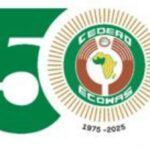ECOWAS at 50: Should the AES Countries Not Reaffirm their Commitment to Founding Treaty and Vision?.
By Raymond Enoch
As the Economic Community of West African States (ECOWAS) approaches a momentous milestone, May 28, 2025, and will mark 50 years since the founding of the organization, many questions are in the minds of the citizens of region.
This historic occasion serves as a reminder of the visionary efforts of Pan-Africanists like Kwame Nkrumah, Modibo Keita, Thomas Sankara, Léopold Sédar Senghor, and Abubakar Tafawa Balewa, who envisioned a united and prosperous Africa. Their dreams materialized through the ratification of the Lagos Treaty in 1975, laying the foundation for what is now the ECOWAS Commission.

General Yakubu Gowon (Rtd), along with the other founding fathers, worked tirelessly to turn this vision into a reality. The creation of ECOWAS marked the beginning of a new era for West Africa, one built on cooperation, economic integration, and mutual development. It was a groundbreaking effort to ensure that the region’s destiny would no longer be dictated by colonial powers but instead shaped by its own people.
Today, as ECOWAS celebrates half a century of progress, it is crucial that the founding ideals of the organization are upheld, particularly by the countries that played a pivotal role in its establishment. This includes the members of the African Economic States (AES)—Mali, Niger, and Burkina Faso. The political shifts in these nations, along with their recent stances towards isolation, have sparked growing concern within the region. It is imperative that these nations do not allow the allure of power, ego, or protectionist policies to sever their historic ties to ECOWAS.
The people of West Africa have long benefited from the shared commitment to regional integration through ECOWAS. As the commission has evolved, so to have its interventions in the lives of ordinary citizens. What began as a government-to-government initiative has transformed into an organization that now works directly with communities, providing programs and projects that support the most vulnerable. This shift, which began in 2010, helped ECOWAS become the “ECOWAS of the people,” ensuring that the needs of West African citizens were at the heart of its mandate.
Specialized agencies and programs within ECOWAS, such as the ECOWAS Trade Liberalization Scheme (ETLS), the ECOWAS Common External Tariff (CET), and the proposed single currency, the ECO, are vital for promoting economic growth and integration. The ECOWAS Standby Force (ESF), Early Warning Response Mechanism (ECOWARN), the ECOWAS Master Plan for Transport Infrastructure, the ECOWAS Court of Justice, and the ECOWAS Parliament also play crucial roles in securing peace, stability, and development across the region.
The legacy of ECOWAS is a shared one, rooted in the sacrifices made by the founding fathers and their commitment to the region’s collective well-being. As the organization celebrates this historic 50-year anniversary, it is essential that the nations of AES consider the foundational realities that birthed ECOWAS. The path forward cannot be clouded by self-interest or the false belief that sovereignty can only be protected in isolation. Rather, it lies in the strength of unity, as the collective commitment to a prosperous West Africa remains the guiding principle of ECOWAS.
The countries of Mali, Niger, and Burkina Faso must recognize the significance of their original commitment to ECOWAS and the enduring value of working together with their regional partners. As we mark 50 years of ECOWAS, it is clear that the future of West Africa depends on the preservation of the unity and cooperation that has brought us this far. It is a future that must not be sacrificed for the ego of any leader or the allure of isolationism. The vision of the founding fathers endures, and it is up to the current leaders to ensure that it remains a beacon for generations to come.









